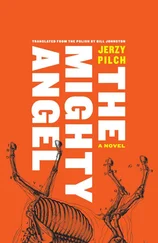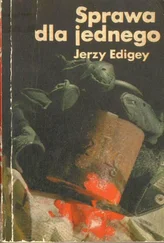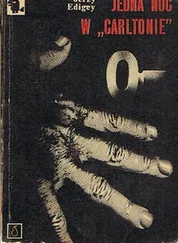And do you know what that scamp did then? She stopped trying to decipher my communiqué, she raised her head as well as her hand, and she began to wave her unparalleled palm in my direction. For a moment yet I remained frozen in my new incarnations; for a moment I was still a bulge caused by moisture, a fragment of a mirror, a cloth bag, but since the angel of my first love saw — quite simply — me, there remained nothing to do but to return to myself. I closed my eyes. I closed my eyes, and I moved along the wall. I disappeared from her field of vision for good. I turned the radio down. I crawled over to the switch and turned off the light. The welcoming banner “WHY DON’T YOU SMILE?” sank into darkness. On the entire planet life came to a standstill.
•
I sat squatting in the darkness, and I was glad it was all over. Time — I repeated a lesson I had recently heard — time heals all. In a couple of weeks I won’t be ashamed of any of this anymore. We had come to the edge point, and we call the edge point of a figure that point in the environment at which points of that figure can be found, as well as points that don’t belong to it. The set of edge points of a figure we call its edge — I whispered this to myself, and I breathed a final sigh of relief.
•
A locomotive was climbing an embankment not far away. It stopped every little bit like a tired hiker. The engineer said something to his assistant. Someone was taking the shortest path in the world between our house and the Rychter Department Store. Someone was walking there at the edge of night, whistling, kicking an empty sardine can. Its impacts on the asphalt resounded with incredible smoothness. Someone guided the empty sardine can like Roman Lentner kicking a soccer ball. Someone kicked a can as great as a soccer ball. He was just about to make a shot in the direction of the goal when suddenly a defender emerged out of thin air. They battled without mercy. The racket and din were such that it might have seemed that they were wearing not team jerseys but thin metal armor. First individual whistles, then more and more frequent ones began to resound from the stands. One after another the strangest objects flew from the stands, and they crashed with a bang on the grass, which was hard as asphalt.
I jumped to my feet, turned on the light, and ran to the window. The angel of my first love was raving like a mad woman. She was whistling through her fingers, as she methodically stripped her room of all its objects, throwing them down onto the sidewalk. Sure — the thought flashed through my mind — after all, she must be something like twenty-six or twenty-seven years old, and at that age objects no longer have any significance. The angel of my first love drove me from the lair of my virginal fear with a hailstorm of ashtrays, silverware, mugs, glasses, all sorts of empty packages. The lights came on in every window of the Rychter Department Store. Accidental passersby were transformed into accidental witnesses. From afar you could hear the siren of an approaching ambulance or fire truck.
Now it was I who waved to her. I let it be known that I am here, that I consent to everything. I sent her missives to calm the air. I soothed her fury with the help of a mad alphabet of incoherent gestures. Finally she noticed me, and she stood stock-still. Now I slowly pointed my index finger at myself, and then I reached both hands out in her direction, which was to signify: “I will come to you right away, and I will allow you to make sport of my young and virginal body.” But she, to my great amazement, shook her head no, and she turned her unparalleled hand down, in the direction of the display window of the footwear section, which was covered with a green grating. I repeated my gesture. She doesn’t understand, I thought — or maybe she just doesn’t believe her own dumb luck. But no, she emphatically and definitively pointed in the direction of the massive grill which was guarding a few pairs of miserable Gomułka-era pumps. I raised the wrist of my left hand, and I pointed at the face of my watch, a Soviet Polyot with a calendar. When? Immediately, she responded, making the zero sign. Upstairs you could hear the spasmodic whispers of the morphinistes. Father sought out the truth between the lines of The People’s Tribune . “Dear and Beloved Reverend Bishop,” Mother wrote, but only as a draft version for now. My legs gave way beneath me. The night had in it the childish intensity of ink.
The angel of my first love stood before the footwear section. She was wearing an unbuttoned black sweater that reached down to the middle of her thigh. Under her arm she clasped something that looked like a purse, or a document case, or a teacher’s day planner.
“What did you write?” she asked with the greatest impatience. In deathly horror I saw, noticed, and remembered everything. In my madness I was quite simply able to foretell not only the final word of as-yet-unuttered sentences — I was able to perceive all of the entire near future. The black sweater meant nothing more and nothing less than that here before me stood — and spoke to me — a woman in a miniskirt. I didn’t believe, nor did I know, that this would ever come to pass. It would be a year before skirts and dresses would be cropped, a year before several hundred million women’s legs would see the light of day, a year before the earth would become as graceful as the kneecap of a high-school girl. It would be a year and a few months before Małgosia Snyperek, who ran the church-fair shooting gallery in the center of town, would let the unimaginable whiteness of her thighs and knees shine forth, and from one day to the next she would be transformed from an inconspicuous duckling, accessible to all, into an unattainable goddess of sex. It would be a year before all the Małgosias of the world would unravel a band of more or less thirty centimeters’ width from their garments, display to our astounded eyes their divine legs, from foot to thigh, and immediately slip away on those naked legs to an insurmountable distance. It would be a year before women again became unattainable. They would become unattainable in the twinkling of an eye, for, in the twinkling of an eye, this laying bare gives the appearance of unattainability. It would all happen in a year.
But meanwhile, the precursor of this revolution stood before me and spoke:
“What did you write?”
“Why don’t you smile?” I managed to stutter.
She remained silent for a moment. She looked at me with the intense inquisitiveness of the innate psychoanalyst, and then she said:
“Because that’s how I am. I don’t smile, and that’s all there is to it. Understand?”
And she smiled mysteriously, took me by the arm, and said:
“Come on, let’s go for a walk.”
It was strange, and, to tell the truth, neither earlier nor later (especially not later) did I ever meet such a peculiar example of the female body: from up close she looked younger.
•
And it was as it always would be in my life: weakness prevailed, but contrariness also prevailed. I ought to have led her. But it was the other way around. It was she who led me, led me through the park that smelled of alcohol, through the soccer field that was going to weed, along the warm river, there and back again. I knew all those places so well that I had long ago ceased noticing them. Long ago those places had left my head. But now she, a scantily clad vacationer, returned being to that which lacked it. I breathed in the smell of her hair. It smelled of Tatar-hop shampoo. I breathed in that smell, and I distinctly felt the gravel of the park lane under my feet. I felt the touch of her hand, and I saw the dark surface of the playing field, the outline of the rotting goals, rooted together with the black stalks of dill, intertwined with the nets that had not been taken down for years. I listened to her peculiar voice, as if stifled, as if struggling with an incessant giggle, and I breathed in the air coming from the river. I didn’t know yet that my situation could be described using classical aphorisms: “You will come to know the lands of childhood, known to you through and through, only at the side of the woman of your life,” said the first aphorism. “You won’t grow up until your beloved looks at your baby photograph,” declared the second piece of wisdom. “The first day of your first love is the last day of your childhood. Until then you didn’t exist,” went the next truth, unshakable in its arbitrariness. To this day I don’t know who the authors of these immortal maxims were. I don’t even recall where I read them or where I heard them. Their author could just as well have been King Solomon as Mr. Trąba, a forgotten classic or a chance traveling companion, the author of school texts or a young poet whose verses no one wanted to print. Even today it is a question without significance. But then, more than thirty years ago, when the angel of my first love led me through the very middle of the land of my childhood, it was absolutely without significance. At that time, not only didn’t I know who wrote the aphorisms that described my situation, I didn’t even know that there were any aphorisms that described my situation. At that time, some indistinct creature, the winged reptile of fear and lust, began to move slowly in the depths of my entrails and in the depths of my soul. I was happy then that I didn’t have to say anything, since she, the angel of my first love, talked incessantly.
Читать дальше












